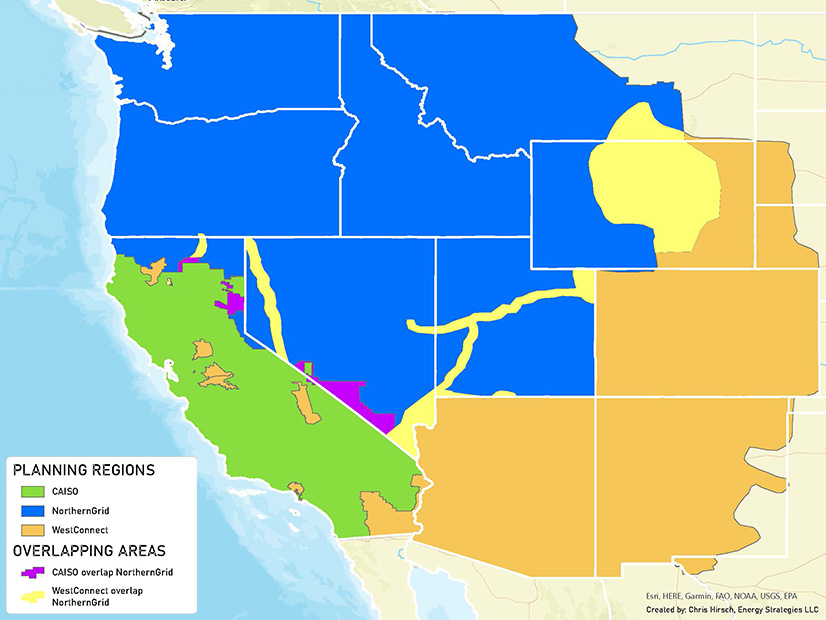
Responding to an appellate court’s concerns about free ridership, FERC reversed a decision that allowed the WestConnect transmission planning region to include a category of participants not subject to binding cost allocation.
Responding to an appellate court’s concerns about free ridership, FERC reversed a decision that allowed the WestConnect transmission planning region to include a category of participants not subject to binding cost allocation.
The order (ER13-75, et al.), issued Oct. 17, could mark the end of a yearslong dispute stemming from FERC Order 1000.
That order, issued in 2011, requires public utility transmission providers subject to FERC jurisdiction to participate in a regional transmission planning process that produces a regional transmission plan.
Nonpublic utility transmission providers may also choose to participate in regional transmission planning by “enrolling” in the effort. They are then required to pay a share of costs for future projects that benefit them.
And in what has become a contentious twist, a FERC-approved framework for WestConnect allows a third category of participants: coordinating transmission owners (CTOs). These nonpublic utility transmission providers participate in determining regional transmission needs and identifying projects that could meet those needs. But once costs of a proposed project are divided up, the CTOs choose whether they want to pay.
If a CTO decides not to pay, WestConnect reevaluates the costs and benefits of the project to determine if it should move forward.
In an August 2023 decision, the 5th Circuit Court of Appeals said FERC’s approval of the framework was “incompatible with the FPA’s [Federal Power Act’s] mandate for just and reasonable rates and with Order No. 1000’s application of the cost causation principle.”
A stated purpose of Order 1000 is to prevent subsidization by ensuring that costs correspond to benefits, the court decision stated, and the cost-causation principle combats “free ridership,” in which an entity is not required to pay for a benefit it receives.
FERC has now directed WestConnect public utility transmission providers to submit compliance filings to revise their Open Access Transmission Tariffs to remove the CTO framework and to update their OATTs to reflect the current list of enrolled members in the WestConnect region.
Long-running Case
After FERC issued Order 1000, the WestConnect public utility transmission providers submitted a series of filings beginning in 2012 to comply with the order’s requirements. WestConnect covers parts of Arizona, California, Colorado, Nebraska, Nevada, New Mexico, South Dakota, Texas and Wyoming.
FERC rejected several of the WestConnect public utility transmission providers’ cost allocation proposals, saying they weren’t consistent with the order’s principles. But FERC accepted the providers’ proposed participation framework in which nonpublic utility transmission providers could participate as either enrolled transmission owners or coordinating transmission owners.
The public utility transmission providers, led by El Paso Electric, took FERC’s rejection of their filings to court.
The 5th Circuit vacated FERC’s orders regarding the transmission providers’ compliance filings and remanded the case “for further explanation and fact finding.”
In 2017, FERC responded with an order on remand. Among the commission’s arguments in support of its decision was that nonpublic utility transmission providers are likely to submit to binding cost allocation so grid-improvement projects meet benefit-to-cost thresholds and can move forward.
FERC also said it could always revisit its approach if free ridership turns out to be more of an issue than expected.
The public utility transmission providers asked for a rehearing, which FERC denied. El Paso Electric then took the matter back to the 5th Circuit, petitioning for review of FERC’s order on remand and order denying rehearing.
The other WestConnect public utility transmission providers intervened in support of El Paso Electric, and the nonpublic utilities intervened in support of FERC.
The court stayed the petition in 2018 while the parties worked on a settlement agreement. But in 2022, FERC rejected the proposed agreement between the public and nonpublic utilities and the court continued with its review of the case. (See WestConnect Tx Cost Allocation Plan Rejected by FERC.)



